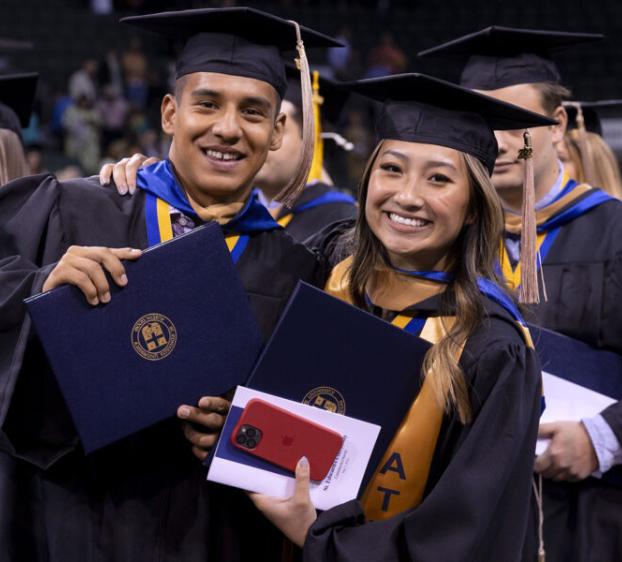Pursue Exciting Career Choices That Change People’s Lives and the Planet
A degree in Biology paves the way to meaningful work. Help people take control of their health and wellness as a doctor, physician assistant or dentist. Provide compassionate care to animals as a veterinarian. Conduct valuable research that advances our understanding of the natural environment and the development of life-saving drugs.
Why earn your Biology degree at St. Edward’s?
Whether you’re interested in the health professions, genetics, ecology or other science-focused fields, one thing is certain: The advantages of your St. Edward’s education will prepare you to succeed. You’ll find opportunities in and outside the classroom to learn, give back and achieve your goals. And your mentors will support you every step of the way.
Build relationships with your professors
You’ll learn in small classes taught by award-winning professors who make a point of getting to know you and becoming your trusted advisors. They’ll help you identify and focus on your goals, and provide guidance and insight during and after your college years.
Conduct graduate-level research
You’ll have the opportunity to engage in faculty-mentored research in the university’s state-of-the-art labs — or Wild Basin Creative Research Center in Austin, a nature preserve managed by St. Edward’s — and present your work at academic conferences and for publication.
Tap into special funding for STEM students
As a student in the Biology program, you’ll gain access to funding programs, including paid internships and tuition awards, and other benefits offered exclusively to STEM students at St. Edward’s through our NSF-funded Institute for Interdisciplinary Science (i4). For those interested in pursuing careers related to ecology and natural resources, additional funding is available through our USDA-funded NextGen E3 Program.
Get involved in the professional science community
The St. Edward’s chapters of the Texas Academy of Science, TriBeta National Biological Honor Society and other academic organizations open doors to research funding; presentations and awards; and connecting with students and professionals who are passionate about science.

Reap the Rewards of Austin
Austin is a fast-growing biotechnology hub and emerging center of life-sciences research and innovation. As a Biology major, you can explore career paths and practical application of your studies through internships and interactions within the greater Austin community.
What do our graduates do?
Biology majors go on to a variety of careers and graduate schools from St. Edward’s. Here’s a sample.
- Antibody Discovery Scientist at MacroGenics, after earning a PhD from the University of Illinois at Chicago
- Data scientist at St. David’s HealthCare, after earning a Master of Public Health from Yale University
- Senior digital strategy consultant for Health, Life Science and Fitness at Ernst & Young
- Director of the Americas at the U.S. Department of Health and Human Services’ Office of Global Affairs
- Consulting analyst at the global consulting firm Accenture
- Regulatory affairs specialist at TMRW Life Sciences.
- Graduate students at the University of Notre Dame, The University of Texas at Austin, Texas A&M University, Saint Louis University, DePaul University, Wake Forest University and the University of California Davis
Explore Details About a Degree in Biology
St. Edward’s offers both BS and BA degrees in Biology, with multiple areas of focus depending on a student’s desired outcome. In addition to the major program requirements, all students must satisfy the general education requirements. Talk with your success coach and faculty advisor about which courses are right for you.
1. Bachelor of Arts in Biology
- Primarily designed for students pursuing a double major or admission to some professional schools.
- Provides a solid foundation in biology with more latitude in the choice of general electives.
- An example of a course you will take is Molecular Genetics, which offers a study of the structure and function of DNA as the genetic material and focuses on details surrounding the “central dogma of molecular biology,” including DNA replication, transcription, RNA processing and translation, as well as mechanisms of control and regulation of expression of genetic information.
General Biology Concentration
View and download the full BA in Biology - General Biology degree plan (PDF)
Allied Health Concentration
View and download the full BA in Biology - Allied Health degree plan (PDF)
BA in Biology + MS in Clinical Laboratory Science (3+2) Program
Earn two degrees in five years: a Bachelor of Arts in Biology from St. Edward’s University, and a Master of Science in Clinical Laboratory Science from The University of Texas Medical Branch. View and download the full 3+2 Program degree plan (PDF)
2. Bachelor of Science in Biology
Health Professions Concentration
- Designed for students who intend to pursue further education and a career in the health professions such as medicine, veterinary medicine, physician assistant or dentistry.
- Degree requirements include the prerequisites for most professional schools.
- An example of a course you will take is Evolution, an in-depth analysis of evolution via natural selection using examples from all major classes of organisms. Emphasis is placed on the mechanism and resulting products of evolutionary change. Evolutionary change is examined at the molecular, organismal and population levels of organization.
View and download the full BS in Biology - Health Professions degree plan (PDF)
Biology Professions Concentration
- Designed to provide a strong background in biology and research.
- Prepares students for education at the graduate level and preparation leading to careers outside the health professions. Students might study molecular biology, cellular biology, developmental biology, microbiology, neurobiology, zoology, botany, ecology or other fields.
- An example of a course you will take is Research in Biology, where students work collaboratively with a faculty member to conduct a research study. Many students go on to present their work at on-campus symposia as well as local, regional and national meetings.
View and download the full BS in Biology - Biology Professions degree plan (PDF)
What You Will Learn and Skills You Will Gain
Majoring in biology provides an incredibly broad understanding of the world around you. You’ll learn the fundamental principles of biology at work in genes, cells, organ systems and even ecosystems.
Your classroom studies and experiential learning activities prepare you with a number of transferable skills that are valuable across many workplaces and employment scenarios, including:
- Problem-solving
- Critical thinking
- Adaptability
- Research
- Developing, testing and iterating on a hypothesis
- Literature review
- Data collection and analysis
- Laboratory research and safety techniques
- Understanding and communicating, both orally and in writing, complex scientific and medical topics
Experiential Learning
Hands-on learning is a strong component of the Biology major, which is seen in courses like these:
Students in the Introductory Biology labs have collected samples from Bee Creek at Wild Basin Creative Research Center, to analyze chlorophyll (a measure of algal blooms), levels of nutrients like nitrates, and abundance of macroinvertebrates as a measure of water quality.
In Entomology, which focuses on studying the evolutionary adaptations and incredible biodiversity found among insect groups, you’ll learn how to collect, preserve and identify insects in the field.
In Cell Biology, you’ll work in groups on a semester-long project to collect and analyze your own data to address a complex research question. You’ll have the advantage of using the Fluoview FV3000 laser scanning confocal microscope, a state-of-the-art $200,000 piece of equipment the university purchased with a National Science Foundation Major Research Instrumentation Grant. The final project is a scientific seminar in which you’ll present the results of your work to an audience of faculty from the department.
If you’re on the health professions track, as a junior or senior you’ll choose the schools where you want to apply, put your application together and write your personal statement, and work with our Health Professions Advisory Committee to prepare for the interview process.
Research
Biology majors at St. Edward’s have the opportunity to work on research with their professors over the summer and during the school year. By working on projects with faculty, you’ll learn about the process of research and develop your lab skills. Students often emerge from these projects with publishable research.
Students have worked with professors studying the roundworm C. elegans, which is often used as a model organism, to study the process of autophagy, an organism’s waste-removal system, and to study neurological development.
Biology majors have worked alongside their professors on a research project that examines how moving a colony affects honeybees’ stress response and ability to fight off infection. They helped maintain several colonies of bees on campus and analyzed the immune systems of bees they collected from the hives. One student also studied how exposure to commonly used pesticides affects bees’ immune systems.
Students have presented their research and won awards at conferences including
- Society for Neuroscience
- Texas Academy of Science
- The Society for the Advancement of Chicanos and Native Americans in Science National Diversity in STEM Conference.
- McNair Scholars Research Conferences
- Annual Biomedical Research Conference for Minoritized Students
- TriBeta Biological Society Regional Research Conference
Biology majors have also been selected for competitive Research Experiences for Undergraduates and for the LIVESTRONG Cancer Institutes’ Summer Undergraduate Research Fellowship at The University of Texas at Austin and Dell Medical School.
Wild Basin Creative Research Center is a 227-acre wilderness preserve located in West Austin and managed by St. Edward’s in coordination with local government entities. The preserve offers opportunities to study the natural world in a beautiful setting. Students have worked on environmental research projects at Wild Basin that include using motion-triggered wildlife cameras to document species diversity; measuring water quality in Bee Creek; documenting the bird species that live within the preserve and recording their songs to see how they change in the presence of human activity; and analyzing the microbial communities in soil across the preserve.
Internships
Pre-health professions students often shadow doctors or volunteer at local hospitals. In addition, Biology majors have completed internships focused on environmental stewardship, clinical health, animal behavior, and medical and pharmaceutical research at the following organizations:
- CD Doyle Clinic, a free clinic run by Dell Medical School students in downtown Austin
- Regarding Cancer, which provides free support services to anyone affected by cancer
- San Antonio Zoo
- Asuragen, which develops diagnostic tests for people with cancer and genetic diseases
- U.S. Department of Agriculture
- The University of Texas MD Anderson Cancer Center in Houston
- Macromoltek, a computational drug discovery company dedicated to the advancement of antibody drug development
- The Nature Conservancy
STEM students at St. Edward’s can access paid internships offered by our National Science Foundation-funded Institute for Interdisciplinary Science (i4). For more information on these internship programs, please visit the Institute for Interdisciplinary Science (i4).
Student Organizations
The St. Edward’s chapter of the Texas Academy of Science supports student research, including presentation and publication opportunities. Members also tutor in the sciences and complete other service projects.
Students with strong academic achievement in the sciences are eligible to join the St. Edward’s chapter of Beta Beta Beta, the National Biological Honor Society.
Students for Sustainability educates the St. Edward’s community about eco-friendly practices and works with the St. Edward’s administration to implement environmental initiatives. Members help maintain the campus garden, learn about biking and public transportation, encourage fellow students to reduce their use of plastic water bottles, and have clothing swaps and upcycled craft nights.
The American Medical Student Association matches freshmen with upperclassman mentors in the same major. Together, members learn from guest speakers — like physicians and Peace Corps Volunteers — and complete volunteer projects.
Pre-health students have participated in the Making Equity Standard in Healthcare (MESH) mentorship day at Dell Medical School in Austin. In this program, current medical students advise undergraduates, particularly those from underrepresented backgrounds, about how to become stronger candidates for medical school. The Saturday program includes a tour of the school, information about the medical school’s distinctive curriculum and its work with the Austin community, and a Q&A with students.
Pre-health professions students can take advantage of annual events sponsored by the Career and Professional Development office. These include on-campus meetings with representatives from graduate programs as well as workshops to prepare you for specific aspects of the application process.
Health sciences schools appreciate applicants who are curious and willing to get out of their comfort zones. St. Edward’s offers opportunities to volunteer with a broad variety of people and learn about the social forces that influence health and access to medicine. Explore our many service programs.
A minor in Biology allows students to explore an interest in biological sciences, while developing skills in scientific reasoning and literacy. A student, in consultation with a Biological Sciences faculty member, develops a customized group of elective courses to complete the minor. A minimum of nine of those elective hours must be from upper-division classes in accordance with university requirements. Total minor hours: 21
Required Courses:
- General Biology I
- General Biology I Lab
- General Biology II
- General Biology II Lab
- Molecular Genetics
- Biology Electives (BIOL 3000+, 10 hours)
Are you a current student? Contact your advisor for the next steps on declaring your major or minor.
At St. Edward’s University, all curricula in the Biological Sciences are founded upon evolutionary theory. As a subject of scientific inquiry, the theory of evolution provides opportunities for testing hypotheses that strengthen our understanding of the processes that account for the diversity of life on Earth, and existing data overwhelmingly support the theory as scientifically sound. We regard any non-scientific or teleological attempts that distract from the scientific processes that underlie science as, at best, a diversion to our mission to provide exceptional education to our students in the Biological Sciences. We stand with the numerous scientific societies that have issued statements on the subject of evolution and intelligent design, confirming the demonstrated success of the former and rejecting the scientific viability of the latter.
At St. Edward’s, our faculty are outstanding scholars, thought leaders, teachers and mentors who bring energy and enthusiasm to our vibrant learning community. They take pride in getting to know you, helping you achieve your goals and celebrating your successes.
View a list of our faculty members and their contact information on the Department of Biological Sciences webpage.

Earn Two Degrees in Five Years
With our Accelerated Graduate Pathways, you can complete your BA in Biology and master’s degree in Business Administration (MBA) in as little as five years, saving time and money. See details and requirements.
Success coaches and academic advisors guide you through undergraduate and graduate courses to maximize benefits.
